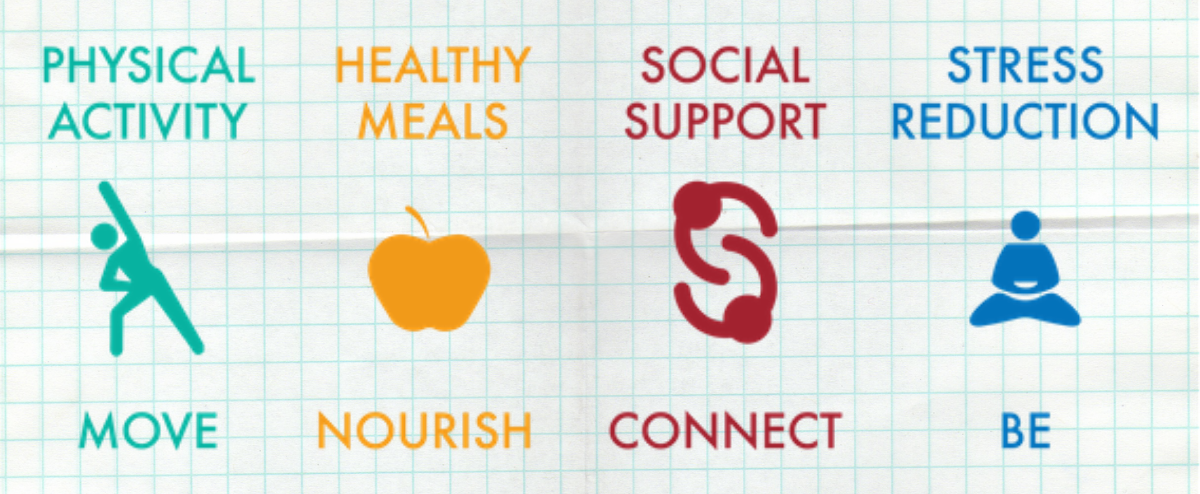Move, Nourish, Connect, Be: Four daily habits to protect our mental well-being while sheltering in place

__
It’s a crazy time. Here in the California, we are sheltering-in-place, leaving the house only for essentials like groceries and medical care. And while we’re all (appropriately) focused on caring for the physical health of ourselves, our families, our communities, and society at large, our mental, emotional, and social health needs are quickly emerging as profoundly important, as well.
I’m executive director of Open Source Wellness, which brings people together to learn and practice the behaviors that generate human health and well-being. Our core idea is that community is a form of medicine. And while we aren’t physically gathering right now, I’m happy to share some of what we have learned for your reflection and personal practice during this time.
First, our everyday social structures have been altered, and some have even evaporated. These structures normally create connection—in meetings and at the water cooler at work, in class and at the playground at school, at the gym and the coffee shop. They also create distance: We say goodbye to our partners and kids in the morning, and we greet them again in the evening. All of this happens automatically, without much effort on our parts. It’s built in to the structure of our society! And while we like to rail against these structures (“Same old, same old, every day”), when they are suddenly removed, people respond in interesting ways.
Some may initially delight in newfound freedom—the removal of constraint. “I can do whatever I want to! Netflix, pajamas, and chocolate all day!” It’s delicious—for a moment.
Others might be initially terrified by newly imposed constraints. Children home all day every day. Spouses suddenly inhabiting the same space 24/7. No more trips to the gym, the café, or your friend’s house. “I gotta get out of here. I can’t breathe!”
Still others are feeling anxiety, or even terror, about the sudden, yawning horizon of solitude. No social events, no classes, no sports…aloneness. “Is anybody out there?”
It’s normal to stagger when the old structures are swept away—but we have the opportunity (and the imperative) to create our own. Intentionally. For our well-being, and the well-being of our families and communities, we are called upon to design sustainable structures that produce sanity, safety, and human thriving.
Whether you’re in generally good health or struggling with chronic physical or psychological conditions, we believe that every person needs these four things, every day!
1. Move. Our bodies need to move. They need to stretch, reach, twist, bend, step, sweat, to whatever degree works for our unique shapes and constitutions. They don’t care if it’s at the gym, out in the neighborhood, or in your living room—they just need activity. It’s not just about “staying in shape.” It’s about your immune health and your mental health, as well! Build movement in your structure, at least 20 minutes per day! YouTube exercise videos range from three-minute workouts to more than an hour, and many of them are family-friendly, too.
2. Nourish. You might have a sense of what foods make you feel lively, focused, resourced, and sane, right? And there are certainly those that are just for fun (hellooo, chocolate). At Open Source Wellness, we suggest not banning or outlawing the small treats that bring you joy, but rather setting up a daily structure that (mostly) fills you with nourishing, healthy foods. Always wanted to make a dietary change, learn to meal prep, teach your kids to cook, or sample a new cuisine? Now’s the time! Structure one or two 30-minute chunks of cooking into your days.
3. Connect. This one, more than ever, is key. Humans need to feel connected. We need to feel seen, heard, and understood by another human—and to extend the same in return. And since it won’t “just happen” throughout your day, you’re going to need to schedule it. More to the point, you’ll need to ask for it. To get vulnerable enough to say, “I really want to connect with you. Can we talk?” Tell the truth about how you’re feeling, what you’re experiencing. Invite them to do the same. Listen with kindness. Offer your support with generosity. High-quality human attention may feel like a scarce resource right now, but you can generate an infinite supply of it.
4. Be. Amid all the “doing”—the preparing, protecting, adjusting, coping, responding, providing, procuring—humans need moments to simply BE. It’s not necessarily about serenity, or warm fuzzy feelings. It’s about pausing long enough to let your nervous system come back to baseline after prolonged activation. Experiment with what works for you. If meditation or guided relaxation works for you, great! If watching a crappy TV show while snuggled into the couch helps you to just BE, that’s good, too. And if painful emotions get too loud or overwhelming when you try to slow down, that’s OK, too.
Of the four aspects of this “Universal Prescription,” which ones are you strongest in? Which ones do you incorporate effortlessly, as a part of your routine? Which ones might need a bit more attention, more practice, more cultivation? Then, pick one to focus on first: How might you structure it into your days?
This is an opportunity to get really intentional. To choose rather than to drift. In the absence of everything that normally dictates our days, we are called on to create the structures that will support our health, physically and emotionally, in a time of profound uncertainty. Try out weaving Move, Nourish, Connect, and Be time into your days.
 – Elizabeth Markle, Ph.D., is a licensed psychologist, researcher, and chair of community mental health at California Institute of Integral Studies. She is the cofounder of Open Source Wellness, a nonprofit initiative offering experiential behavioral health and wellness via a “behavioral pharmacy” approach in collaboration with health care providers and insurers. Based at UC-Berkeley, Greater Good highlights ground breaking scientific research into the roots of compassion and altruism. Copyright Greater Good.
– Elizabeth Markle, Ph.D., is a licensed psychologist, researcher, and chair of community mental health at California Institute of Integral Studies. She is the cofounder of Open Source Wellness, a nonprofit initiative offering experiential behavioral health and wellness via a “behavioral pharmacy” approach in collaboration with health care providers and insurers. Based at UC-Berkeley, Greater Good highlights ground breaking scientific research into the roots of compassion and altruism. Copyright Greater Good.
To Learn More:
- Four tips to practice good mental hygiene during the coronavirus outbreak
- Study finds a key ingredient in mindfulness training: Acceptance (not acquiescence)
- Positive solitude, Feeling active and Future-mindednes: Three Keys to Well-being
- New study reinforces the importance of walking through forests for mental and general health
- Six tips to build resilience and prevent brain-damaging stress
- The Ten Habits of Highly Effective Brains



I really resonated with the nourish and be recommendations above. Over the last two years I suffered from a lot of stress as a result of my business nearly going bankrupt multiple times. I didn’t take my health seriously and started doing some really bad behaviors as a result. One of my girlfriends got me into smoking pot and that made things worse for my sleep and my business and my whole life. It’s so critical that people take stress seriously and don’t try to hide it with drugs. I replaced pot with hot baths. I started noticing when I was not controlling my anger very well and forced myself to take long walks, sometimes even hours a day if necessary. I replaced literally 100 pounds of fried bacon each year with lots of soy and other beans. And connections, so important. I’m a cat lover — I have 14 believe it or not — and I joined a DFW based cat club called Fort Worth Feline Fans (FFF) and just getting to meet people who weren’t from my business and that world of failure and stress made an enormous improvement. I’m not perfect but I’m doing the best I can.
Dear George, thank you for sharing your experience and your lessons learned :-) We’re hoping that articles like these help inspire and inform readers to follow positive examples such as yours. Best regards!